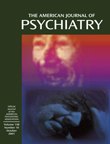To the Editor: The development of a screening questionnaire for bipolar spectrum disorder, described by Robert M.A. Hirschfeld, M.D., et al.
(1), was long overdue and will certainly help focus attention on the recognition and treatment of these disorders. Although clinicians and researchers alike will find this study of great interest, I would like to point out some factors that may affect the assessment of this instrument.
First, bipolar spectrum disorders are likely quite heterogeneous with regard to their ease of diagnosis. It is generally much more difficult to elicit a history of bipolar II disorder or cyclothymia than of bipolar I disorder. The patient may think that the periods of elevated mood are simply a normal period of joy expressed when he or she recovers from the more obvious depressive episodes. On the other hand, persons prone to have a relatively changeable affect (e.g., those with borderline personality disorder) may erroneously report their very transitory (e.g., 1-hour) periods of excitement as hypomanic episodes. Furthermore, precisely because of the difficulty in detecting these illness subcategories, a good screening instrument is sorely needed. Thus, although the numbers of patients diagnosed with bipolar II disorder (N=26) or bipolar disorder not otherwise specified (N=13) in this study were much lower than those diagnosed with bipolar I disorder (N=70), it would be interesting to know how the instrument performed in detecting the subcategories of bipolar disorder in patients. I would speculate that while the overall sensitivity of the instrument in this study (0.73) is adequate, it might not be so for these subcategories.
Second, the authors did not mention how the questionnaire was presented to the patients (appropriately, its title does not give away its intent), what proportion of the patients who were asked to complete the questionnaire did so, and whether all of those who filled in the questionnaire completed the Structured Clinical Interview for DSM-IV (SCID). All these factors may have had a bearing on potential biases in the study. For example, those who recognized some of the symptoms in the questionnaire may have been more likely to complete it and the SCID.
Third, that current patient clinical status may have affected the performance of the instrument is not mentioned. In clinical practice, patients who are currently depressed or hypomanic both tend to minimize or deny their hypomanic episodes. An interesting exercise in a study such as this would be a qualitative questioning of those for whom the results of the screening instrument and the SCID diagnosis were discrepant to determine the reasons for such discrepancies.

